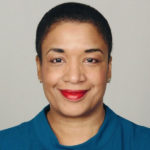Responding to the Critical Moment

By Risha RaQuelle, Chief Strategy Officer

This month, we are sharing more information about AAG’s Research Partnerships Initiative, and specifically the current Request for Partners (RFP) for Targeted Mentoring Networks. During AAG’s months of development around these initiatives, as well as the discussions and insights offered by participants at AAG 2024, I was reminded of a term that is often used and sometimes comes under fire, yet is seldom fully understood. That word is “critical.”
In her recent column on the importance of language and terminology in education, outgoing chair Dr. Caroline Nagle of the AAG’s Justice, Equity, Diversity and Inclusion (JEDI) committee discussed the temptations and pitfalls to “rebranding” a word or concept that is attracting pressure and attention. She was speaking primarily of the terms associated with Diversity, Equity and Inclusion (DEI), but could easily have been speaking of a word like “critical,” which has been a flashpoint for ideological attacks on everything from educational goals for critical thinking to the development of critical race theory, a legal concept widely misidentified with all race-conscious educational efforts.
It turns out that “critical,” like the discipline of geography itself, is a complex, multi-faceted concept, oversimplified in the public eye. Its surprising origins and shades of meaning are worth exploring as we become more proactive and responsive to ways to strengthen and support the talented people who should be—and stay—in our field.
In last month’s column, I spoke of the fact that cultures of care do not, typically, simply come together because someone just thought it was a good idea. All too often a critical incident reveals the harmful inadequacy of a system or community to meet the needs of all people, whether in a department or program or at an institution itself. A culture of care is initiated because something happened, someone was excluded or harmed, and care must be prioritized to prevent the event repeating. Here, the root meaning of critical matters greatly: from the Greek medical word krisis, meaning a point at which a patient can either improve or worsen. These incidents are decisive points in which we can choose to address harm and strengthen our support systems, or permit the harm to metastasize instead. Notably, crisis and critical are also related to krinein, meaning “to separate, decide, judge…distinguish.”
These meanings suggest a specific perspective for our work of care and transformation in geography. We are challenged as never before to reflect, respond, speak, and intervene where we can by using observation and discernment; to collectively and individually identify the critical moments that point to an urgent need for action.
Collective Care in a Time of Constraint
The reality now is that many of us are working in environments where it can be hard or impossible to meet these needs directly because the very act of speaking up, naming issues and specific incidents, or confronting systemic issues has been hampered by formal or informal silencing, policies against DEI training and activity, and the like. That is why it will be ever more important for the AAG to support and lead proactively, to put the elements of care in place and monitor progress through our JEDI Committee and research partnerships.
We know that critical incidents do not magically go away in the memory or in the present reality of our lives. They remain part of the work—hopefully a catalyst, but often an obstacle. We must support one another with caring strategies to help us share knowledge, co-create, organize, and make the discipline better.
Explore the AAG Targeted Mentoring Network Effort
Mentoring is one of many important areas of educational and professional support, with powerful potential to detect, correct, and hopefully prevent critical incidents, along with its value for the important decisions about research and careers. Yet mentoring is often thought of as one-dimensional, as a classic one-to-one and one-way relationship of an experienced sage to new acolyte. AAG is seeking new ways to energize the practice of mentorship, and specifically to seek partnerships to co-identify grant funding to seed and support ways to mentor geographers with more sensitivity to their identities, needs and aspirations, life experiences, and backgrounds through creating partnerships to develop Targeted Mentoring Networks.
With the leadership of the Targeted Mentoring Network (TMN) Working Group, and the support of the incoming AAG president Patricia Ehrkamp, chair of the AAG Mentoring Task Force, we have issued the first formal Request for Partnership (RFP) of our Research Partnership Initiative, focused on targeted mentoring networks (TMNs). We are open to your ideas for a variety of TMNs, and we believe in a plurality of answers that allow participants to acknowledge certain aspects of their career identity, inclusive of their positionality, and intersectionality. Finding guidance through the unbeaten pathway of our interdisciplinary field often requires more than one mentor. Through the options explored in the TMN initiative, we hope that geographers will be able to connect to any number of TMN they identify with, helping them build their “Mentor Map.”
Join us in exploring what the Targeted Mentoring Networks effort can become. The RFP is active through August 5. We encourage you to learn more and apply.
This award is based upon work supported by the National Science Foundation under Award No. 2324401 and Award No. 2324402. Any opinions, findings and conclusions or recommendations expressed in this material are those of the author(s) and do not necessarily reflect the views of the National Science Foundation.
The AAG Culture of Care column is an outreach initiative by the AAG JEDI Committee. Don’t forget to sign up for JEDI Office Hours. The current theme of Office Hours is An Ethos of Care in the Research Enterprise.


